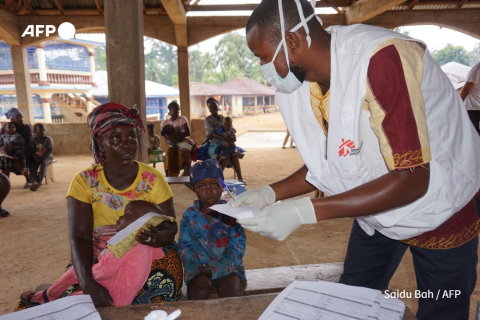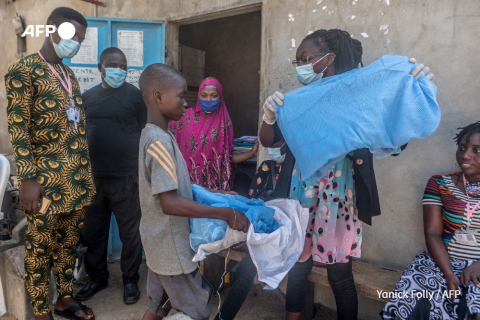Malaria thrives on back of Covid-19

By Saidu BAH
In Sierra Leone the malaria epidemic has worsened as people stay away from hospitals due to fears of being infected by Covid-19.
KENEMA, Sierra Leone, August 19, 2020 (AFP) - In the countryside of Sierra Leone, doctors are used to treating seriously ill children. But they have still been alarmed by the gravity of this small 18-month old girl's condition. Malaria, an age old evil in the region, is thriving due to fears of the coronavirus.
With bloodless face and thinning hair, the little girl was admitted in July to the hospital of Hangha, in the south east of Sierra Leone. The diagnosis is unusual, even in a West African country where the rate of infant mortality is one of the highest in the world. It is an alarming mix of pneumonia, diarrhoea and malaria.
"She could no longer stand, or even sit," her mother, Adama Ansumana, tells AFP, sitting on a bench in the intensive care unit, her sleeping child on her lap.
Adama's little girl has come through for the moment, but doctors have pointed to an alarming spiral in the number of extreme cases since patients started avoiding going to the hospital for fear of being infected by the coronavirus, which emerged at the beginning of the year.
The NGO Doctors Without Borders (MSF), which runs the hospital at Hangha some 10 kilometres from Kenema, the country's third city, has recorded a 40 percent drop in admissions since March in its 63-bed hospital.
Lack of adequate medical care is particularly dangerous for children during the current rainy season, when malaria breaks out due to the increase in the mosquito population.
Toxic remedies : Malaria is one of the oldest and most deadly diseases on the African continent. Caused by parasites transmitted through mosquito bites, it initially causes a high fever, headaches and sore muscles, then can develop into severe anaemia, respiratory distress and spread to the vital organs and the brain if not quickly treated.
Some 219 million people were infected by malaria around the world in 2017, of whom 435,000 died. More than 90 percent of the victims were in Africa, according to the World Health Organization (WHO).
"We are confronted by a malaria epidemic, with symptoms of severe malnutrition for most of the children who arrive at the hospital", Belgian doctor Laure Joachim, a member of MSF's medical team at Hangha hospital, says.

For fear of being infected by the coronavirus, many victims have preferred to turn to traditional medicines, sometimes making their illnesses worse.
"Many children are seriously ill, with several organs failing because some traditional plants are toxic," Joachim says.
Despite a subsoil bursting with diamonds, not least in the Kenema region, Sierra Leone is one of the world's poorest countries and its health system remains very fragile.
The country has officially registered just 2,000 cases of Covid-19, of whom 69 have died.
Trauma and disinformation : But the former British colony of some 7.5 million people was hard hit by the Ebola epidemic in West Africa which killed nearly 4,000 people in the country between 2014 and 2016.
And it is still struggling to recover from a civil war which left some 120,000 dead, nearly 20 years after the end of the conflict.
The trauma of the Ebola epidemic has had a huge effect on public confidence, according to Sahr Abdulai Surkiti, a medic who travels countryside to raise people's awareness about malaria despite a measly salary.
"When the ambulance came to pick up an Ebola sufferer, he never came back," he recalls. According to MSF some 200 medics in the region of Kenema lost their lives fighting Ebola.
Fake news about Covid-19 also contributes to keeping patients from the hospitals and health posts, which are generally under-equipped.
"People are afraid. And we have no water, not even a motorbike to get around on," says Sarah Vandi, a nurse in the remote village of Talia.
As a result, malaria "continues to cause great suffering and to decimate families" in Sierra Leone, despite the distribution by the government since March of four million mosquito nets, complains Samuel Juana Smith, an official at the health ministry.
